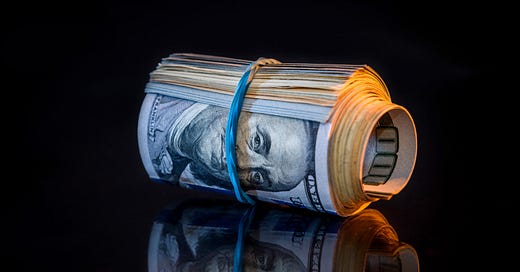When are big-money contributions to super PACs corrupting?
Why a legal case in Maine working its way through the courts is worth watching
Can contributions to super PACs be corrupting?
That question is at the heart of a lawsuit being heard next week in federal court in Maine, where two super PACs are challenging a ballot measure passed by 75% of Maine voters in November 2024 that limits contributions to super PACs to $5,000 per year.
Super PACs — which are currently allowed to accept contributions of unlimited amounts and must not coordinate their spending with political candidates — have proliferated at the federal, state, and local levels since two court rulings in 2010 ushered in a new era of big-money politics.
In January 2010, in a case called Citizens United v. Federal Election Commission, the U.S. Supreme Court ruled that political ads known as independent expenditures — including independent expenditures made by corporations — “do not give rise to corruption or the appearance of corruption.”
Two months later, relying on the logic of Citizens United, the D.C. Circuit Court of Appeals, in a case called SpeechNow v. Federal Election Commission, struck down contribution limits for political action committees focused on making independent expenditures, groups now colloquially known as super PACs.
But in the 15 years since these two rulings, evidence has been mounting that the courts erred in their assumptions about the corrupting influence of big-money contributions to super PACs. At least that’s the argument being made next week in federal court in Maine in defense of the recently passed ballot measure.
How the Courts Failed to Anticipate Super PAC-related Corruption
“While it may have seemed implausible to the SpeechNow court that a candidate would trade official acts in exchange for a $5,500 contribution to a policy-focused nonprofit, the same cannot be said about, say, a $50 million contribution to an entity that exists for the sole purpose of electing the candidate,” argues Maine Attorney General Aaron Frey.
“SpeechNow failed to anticipate the major loophole it was creating in federal campaign finance laws, authorizing the creation of entities designed to act as de facto campaign organizations but unfettered by the contribution limits meant to ensure that candidates and donors do not trade official acts for campaign support,” Frey says in his brief before the court.
That argument is echoed in legal briefs by the main proponents of the Maine ballot measure as well.
“The fact that super PACs make independent expenditures does not ensure that they receive independent contributions free from quid pro quo corruption (or its appearance),” write fair elections organization EqualCitizens and Mainers Cara McCormick, Peter McCormick, and state Sen. Richard Bennett (R-Oxford) in their brief to the court.
These briefs cite two high-profile cases in which such allegations of corruption have arisen — one involving a powerful Republican state legislator and one involving a powerful Democratic senator.
Alarming Examples from New Jersey and Ohio
The first of these corruption cases involves Republican Larry Householder, the former speaker of the House of Ohio.
While he was the speaker of the House in Ohio, Householder led a racketeering conspiracy involving approximately $60 million in bribes in exchange for legislation to give utility company FirstEnergy a $1 billion bailout — crimes for which he was sentenced, in 2023, to 20 years in prison.
Some of this money flowed from FirstEnergy to big-money political groups empowered by Citizens United and SpeechNow — i.e., dark money groups and super PACs — including a super PAC that targeted Householder’s opponent in the 2018 Republican primary and another that aided other GOP candidates in 2018 favored by Householder.
Meanwhile, in 2015, then-Sen. Robert Menendez (D-NJ) was indicted by the Justice Department in a bribery case for allegedly performing official actions in exchange for gifts and political contributions from his friend Dr. Salomon Melgen, a Florida eye doctor whose political giving included $600,000 in 2012 to a super PAC supporting Menendez’s reelection that year.
Other gifts to Menendez allegedly included flights on Melgen’s private jet, numerous vacations at Melgen’s Caribbean villa in the Dominican Republic, and a hotel room in Paris.
Prosecutors accused Menendez of using the power of his Senate office to benefit Melgen’s financial and personal interests — including supporting the visa applications of multiple of Melgen’s girlfriends as well as intervening in federal administrative proceedings on behalf of Melgen, who had overbilled Medicare programs by tens of millions of dollars.
In 2017, that corruption case ended in a mistrial, but Menendez was found guilty last year of taking bribes in cash and gold and acting as an agent of the government of Egypt. Earlier this year, he was sentenced to 11 years in prison.
The Dangers Continue Today
These two cases rank among the highest-profile examples illustrating the dangers of corruption associated with super PAC contributions, but they are not the only ones.
Just this year, President Donald Trump has attended at least four fundraising events for his main super PAC, a group known as the Make America Great Again Inc. super PAC, where donors have ponied up $1 million per plate and which have been held at Trump’s Mar-a-Lago club in Florida and his golf course in northern Virginia.
And after billionaire Elon Musk invested more than $290 million into Republican candidates and groups ahead of the 2024 election — nearly all of which supported Trump’s presidential bid — Trump tapped Musk to lead the work of the so-called Department of Government Efficiency (DOGE), which has been wantonly cutting government services and programs, without any known cuts to any of Musk’s government contracts. (Indeed, Musk has seen additional government contracts steered his way and several of his regulatory concerns fade away.)
What’s at Stake
Issue One has long warned about the dangers of corruption between candidates and supposedly independent big-money political groups, especially when the supposed independence is just a facade.
In the 15 years since the disastrous Citizens United and SpeechNow court rulings, it is alarming that politicians of both parties continue to abuse anti-corruption rules designed to help ensure the government is responsive to the needs of all Americans, not just the wealthy and the well-connected.
With the lines between supposedly independent big-money outside groups and candidates’ official campaign committees getting blurrier and blurrier with every passing election, policymakers and the courts would be wise to remember that limits on political contributions are permissible if they address actual or apparent corruption.
As the defenders of the Maine ballot measure have said in court, limiting contributions to super PACs will increase the incentives for politicians to be as responsive as possible to the broad electorate they are elected to represent and decrease the risk that politicians will become dependent on just a handful of wealthy individuals, many of whom may not even reside in the areas elected officials represent.
For our government to be of the people, by the people, and for the people, it cannot be for sale to the highest bidder.





